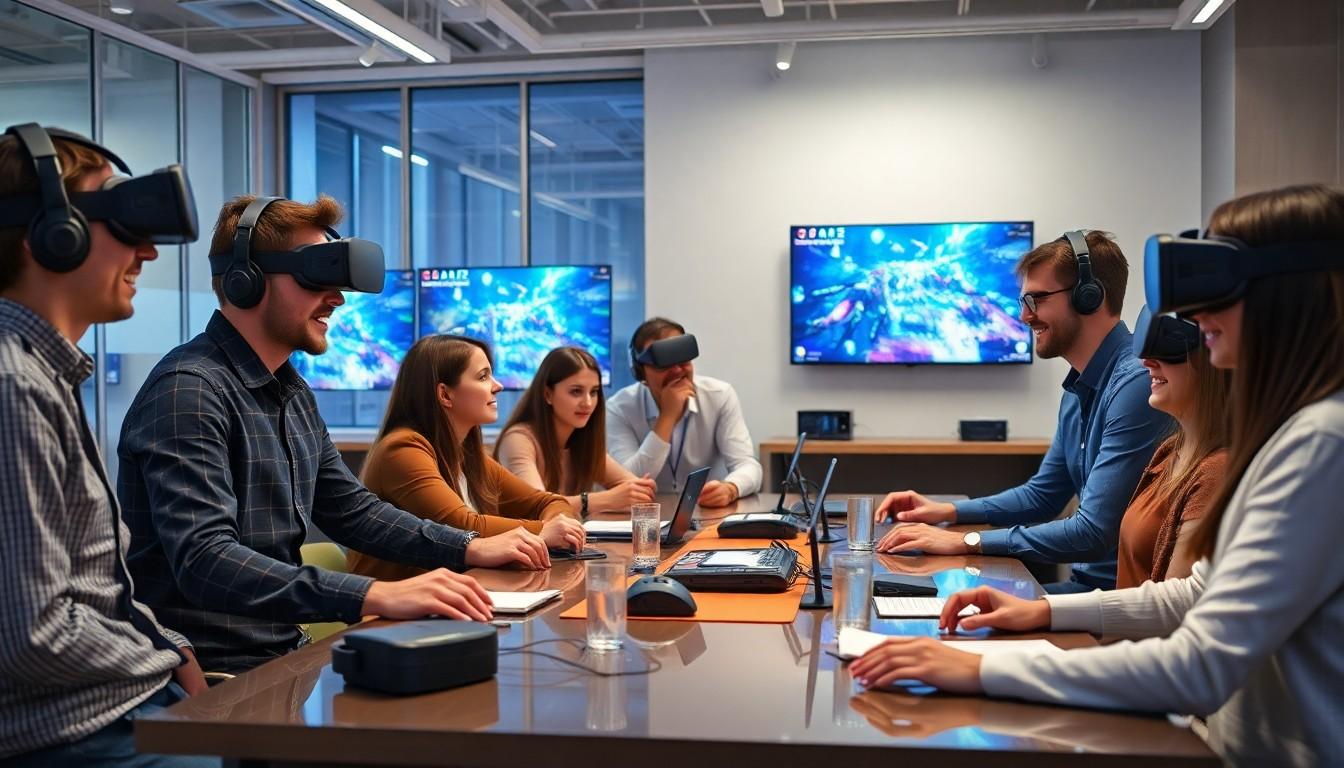In a world where reality sometimes feels a bit too mundane, virtual reality game development companies are crafting experiences that transport players to far-off galaxies, mythical realms, and even underwater adventures—all without the need for a wetsuit. These innovative wizards blend technology and creativity to create immersive worlds that keep gamers coming back for more.
Imagine battling dragons, solving puzzles, or even just hanging out with friends in a virtual café—all from the comfort of your living room. As the demand for engaging VR experiences skyrockets, these companies are at the forefront of a gaming revolution. They’re not just building games; they’re building entire universes where imagination knows no bounds. If you’re ready to dive into the future of gaming, it’s time to explore what these virtual reality pioneers have to offer.
Virtual Reality Game Development Company
Virtual reality game development companies specialize in creating immersive experiences for players. These entities leverage cutting-edge technology, including VR headsets and advanced gaming engines, to develop compelling narratives and interactive gameplay. Equipped with skilled developers, artists, and designers, these companies transform creative concepts into engaging virtual environments.
Many companies focus on specific genres within VR gaming, such as action, adventure, simulation, or educational experiences. For instance, some develop intense combat scenarios while others emphasize puzzle-solving or exploration. A diverse array of options caters to various player preferences, enhancing user engagement.
Collaboration plays a crucial role in the development process. Companies often partner with hardware manufacturers to optimize their games for specific devices. Additionally, they collaborate with playtesters to gather feedback, refining experiences based on user input.
Investment in research and development significantly contributes to the growth of these companies. Embracing technological advancements allows them to push the boundaries of what’s possible in gaming. Companies continually seek ways to enhance visual fidelity, improve responsiveness, and create more realistic interactions.
Market trends indicate a rising demand for VR content across multiple sectors. As industries such as education, healthcare, and real estate adopt VR technology, game developers are exploring new opportunities beyond traditional gaming. This expansion reflects their adaptability in meeting evolving consumer needs.
Overall, virtual reality game development companies are at the forefront of the gaming industry. Their dedication to innovation results in immersive experiences that redefine how players interact with digital content. These firms shape the future of entertainment by crafting entirely new worlds that captivate and inspire users.
Key Features of Successful Companies
Successful virtual reality game development companies demonstrate distinct features that contribute to their influence in the industry. These characteristics include innovative technology integration and skilled development teams.
Innovative Technology Integration
Innovative technology integration sets successful companies apart. Cutting-edge tools and platforms enhance gameplay and create immersive environments. Companies utilize advanced gaming engines, optimizing graphics and physics for realistic interactions. VR headsets play a crucial role, providing players with engaging experiences. Continuous investment in research yields fresh technologies, pushing the boundaries of what’s possible in gameplay. Utilizing augmented reality adds another layer of interaction, enriching the player’s connection with the virtual world. These firms ensure compatibility with diverse devices, expanding accessibility and reaching a broader audience.
Skilled Development Teams
Skilled development teams drive the creative process behind successful VR games. Diverse professionals, including developers, artists, and designers, collaborate to bring ideas to life. Each expert contributes unique strengths, ensuring a well-rounded approach to development. Strong communication within teams fosters creativity and enables efficient problem-solving. Training and continuous education keep these teams updated with evolving technologies. Emphasizing user feedback during development leads to improved gameplay experiences. Moreover, a culture of innovation encourages team members to experiment and explore outside-the-box ideas. All these factors culminate in games that resonate with players and elevate industry standards.
Major Players in the Industry
The VR game development industry features a mix of established companies and rising startups. These players consistently contribute to the evolution of immersive gaming experiences.
Established Companies
Major companies dominate the market with extensive resources and industry experience. Oculus Studios, owned by Meta, leverages cutting-edge technology to create standout VR games. Valve, known for its Steam platform, also invests heavily in VR game development, producing acclaimed titles like Half-Life: Alyx. Sony Interactive Entertainment continues innovating with PlayStation VR, offering exclusive titles that attract a dedicated player base. Additionally, Electronic Arts focuses on broadening its portfolio through partnerships with experienced VR developers. Each of these companies capitalizes on its strengths, influencing trends and setting standards within the industry.
Rising Startups
Numerous startups are emerging in the VR game development scene, bringing fresh ideas and innovative approaches. Innerspace VR, known for its unique storytelling techniques, offers immersive experiences that captivate players. Another notable player, Resolution Games, specializes in social VR gaming, creating engaging multiplayer experiences. The startup beat games like “Acron: Attack of the Squirrels!” illustrates the potential of cooperative gameplay. Additionally, Vertigo Games focuses on creating visually stunning titles, pushing the limits of VR technology. Collectively, these startups are redefining the gaming landscape, capturing attention with their creativity and dedication to user experiences.
Challenges in Virtual Reality Game Development
Virtual reality game development presents unique challenges that companies must navigate to deliver compelling experiences. These hurdles often stem from technical limitations and fierce market competition.
Technical Limitations
Technical limitations pose significant challenges in virtual reality game development. High hardware requirements restrict accessibility, forcing developers to optimize performance for various devices. Creating realistic graphics demands powerful engines, which can amplify loading times and reduce fluidity. Motion sickness also impacts player experience; developers must balance immersion with comfort. Additionally, integrating advanced interactions requires extensive testing, often prolonging development timelines. Companies must invest in specialized tools to overcome these challenges, ensuring their products meet user standards while pushing technical boundaries.
Market Competition
Market competition within the VR gaming industry is intense and constantly evolving. Numerous companies, both established and emerging, vie for consumer attention. This saturation drives innovation; developers must continuously enhance gameplay to stand out from the crowd. Marketing also plays a crucial role, necessitating strategies that effectively communicate unique selling points to potential players. Adapting to changing consumer preferences further complicates matters, as developers must respond to trends and player feedback immediately. Staying competitive demands agility and foresight, making it essential for companies to keep a pulse on the industry landscape.
The landscape of virtual reality game development is thriving as companies push the boundaries of what’s possible in gaming. With a focus on innovation and collaboration these developers are not just creating games but entire immersive worlds that engage and inspire players. As technology advances the potential for unique storytelling and interactive experiences continues to grow.
The commitment to research and development ensures that these companies remain competitive in a rapidly evolving market. By embracing emerging trends and leveraging skilled teams they are well-positioned to meet the rising demand for captivating VR content. The future of gaming is bright as these pioneers lead the charge into new realms of entertainment.





